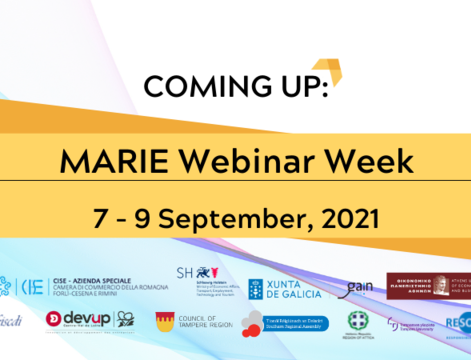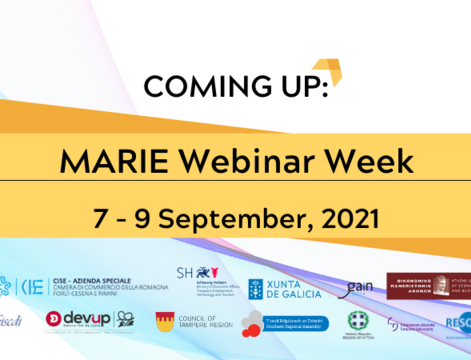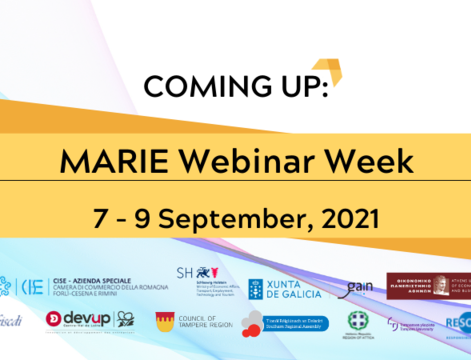
DOUBLE POLICY IMPROVEMENT ALERT!
Two new policy improvements thanks to interregional exchange in MARIE!
The European Commission (Science in Dialogue Towards a European Model for Responsible Research and Innovation, 2012) states: “we can only find the right answers to the challenges we face by involving as many stakeholders as possible in the research and innovation process. Research and innovation must respond to the needs and ambitions of society, reflect its values, and be responsible.”
The statement is clear, but the road from intent to implementation is long.
EU regions are starting to address Responsible Research and Innovation (RRI), but they face common challenges of perceived complexity of the concept and means of application, lack of appropriate approaches for public authorities and lack of awareness over its huge potential impacts.
In MARIE, partners from 8 regions face these challenges together in the context of their smart specialisation priority sectors. Their objective is to improve regional public policy that supports delivery of RRI to enterprises’ product, process and service design, production and distribution. Changes are expected in projects funded by policy instruments and in policy management structures and strategic focus, including integration of RRI criteria and RRI as a horizontal concept.
MARIE achieves this through exchanging experiences on 3 types of support action contained in the RRI framework: Quadruple Helix; Open Innovation; Information & Tools for RRI application.
Using interregional activities, communication and stakeholder engagement, partners develop Action Plans that result in: improved policy instruments; more and better targeted funding for RRI delivery; increased capacity among innovation actors; consolidated partnerships of quadruple helix innovation chain stakeholders.
All innovation chain players benefit. MARIE works towards a medium-term impact of increased awareness and capacity on RRI delivery and a long-term impact of increased responsibility in innovation, with correlated benefits in growth and competitiveness.
Learn more here...
€2,098,163.00
Research and innovation
MARIE partners want to integrate the concept of responsibility into regional funding programmes for innovation. Policy changes within the project are expected to lead to a greater awareness of the socio-economic benefits of responsibility.
MARIE partners have prepared their Action Plans and policy changes have come in different ways. You can find them here - have a look, get inspired !
Our first official Policy Improvement was from Tampere region - responsibility criteria integrated into a regional ERDF call on Artificial Intelligence. Read all about it here.
In our second official Policy Improvement, Southern Region Ireland has integrated responsibility criteria into the monitoring system for their ERDF ROP. Read here how they did it and check out here what they did after that: integrating RRI into Regional Spatial Economic Strategy (RSES) for the Southern Region Ireland!
Our Lead Partner CISE has been busy too. Our third official policy improvement means that Responsible Innovation is now a strategic objective in the multi-annual programme of Romagna Chamber of Commerce. You can find out more here.
Double policy improvement in 2020, with Region of Attica including RI criteria in an ERDF funding call for innovation and Dev'Up in Centre Val de Loire boosting networking and communication between social innovators and economic developers. Find out more here.
The Multiannual Programme (MP) is a strategic and financial framework for Forlì-Cesena Chamber Commerce (CC). It produces annual work plans to support enterprises in the territory, with specific actions, budgets and progress/performance indicators.
The MP defines how the CC can support the territory to overcome the recent economic crisis. It is designed to support competiveness within economic growth and social cohesion.
MP priorities include sustainable development, Corporate Social Responsibility (CSR) and innovation as key drivers for competitiveness. MP promotes cooperation with regional High-Tech Network (innovation centres, labs and techno-hubs). MP supports and provides funding for:
All action lines are delivered by CISE (MARIE Lead Partner), who sees the MARIE project as an opportunity for a number of improvements. The MP should have a sharper focus on key RIS3 sectors in Forlì-Cesena (food, wellness industries and technology providers). It would also benefit from an integrated RRI approach, linking innovation and societal and environmental challenges. Currently, CSR and innovation are dealt with separately.
The strategy supports the role of research as economic growth engine. It will connect Romania to EU science and technology priorities. It aims to: increase economic competitiveness through innovation; increase Romanian contribution to the advancement of knowledge; increase the role of science in society.
The strategy is based on 3 pillars: regional and global affirmation: enterprises as key innovation actors; excellence through internationalisation; regional leadership in strategic science and technology: breakthroughs.
The National strategy and related research have identified the need to focus the RDI ecosystem on innovations that respond to societal challenges. This strategy is coherent with the objective of smart, sustainable and inclusive growth. Promoting RRI methodologies and tools is a concrete step in this direction. However, this is a novelty in Romania and the concept of RRI is not yet explicitly stated in the strategy.
The Strategy states that environmental protection is a priority of every policy and mentions that development is pursued for advancing solutions to relevant societal issues. The S3 supports actions addressing environmental and climate change. This is the foundation for a coordinated RRI approach and the strategy offers a clear opportunity to insert RRI as a central pole for growth. This would be a significant improvement, helping to reach development targets and objectives related to social and environmental responsibility.
The overall policy objective of relevance to the MARIE project, is to enhance networking and communication support for improving social innovation delivery by social enterprises
Within ROP Axis 1, Region of Attica commits to delivering and strengthening innovation. Given the current economic situation, innovation delivery (as other priorities) is situated in a context of social innovation. The policy instrument aims to deliver innovation that meets societal needs. Thus, there is a focus on social enterprises.
The instrument supports networking between key actors in the social innovation chain: existing/potential social enterprises, entrepreneurship support organisations, academic/research organisations, with the aim of improving delivery of socially innovative products and services. Activities include: development of business fora, mentoring, academic/research support, networking between innovative social enterprises. The multitude of activities illustrates that the promotion of social innovation is a high priority in the regional context.
This policy instrument could benefit from a structured RRI approach, for social enterprises. Existing networking activities could benefit from insertion of a quadruple helix cooperation structure and from information and tools that help raise awareness on and capacity in RRI. Open innovation tools could bring R&D results into social enterprises and better deliver socially innovative products and services.
ROP GALICIA Axis 1 aims to:
The policy supports public and private R+D infrastructures, R+D processes in firms and RTOs, creation of R+D networks. It covers business R&I investment, product and service development, technology transfer, social innovation and public service application, demand stimulation, networking, clusters and open innovation. Expected impact is increased regional socio-economic development; reduced gap between regional public and private R+D+I investment; new and reinforced support and knowledge-exchange structures with capability to increase impact of new investments and their link to production of goods and services.
Until recently ERDF in Galicia was mainly used for infrastructure. Now it is used to change regional production model through knowledge-driven processes. This requires involvement of key stakeholders, who participated in S3 elaboration. Participation of SMEs in innovation, private investment in R&I and technology transfer has not grown as expected. The same refers to regional capacity to attract innovation talent. RRI could provide solutions. This approach was not considered at the time of elaborating S3 and could be a key change.
The overall objective of the selected policy instrument is to accelerate multidisciplinary and inclusive development of new product and services.
Funding is provided to create and support Open Innovation platforms, one of the public support tools analysed within MARIE. Funding is provided for platform operators that want to introduce a novel method and environment for cross-sectoral co-creation and create a vivid innovation community. It covers innovative co-creation environments, co-creation processes, demonstrations and innovative procurement. Outputs include demonstrations, business and service concepts, prototypes, trials and start-ups.
Platforms are located in 3 campus areas in the city of Tampere. The Axis expects to create and develop research, knowledge and innovation centres by developing RDI environments and platforms taking into consideration regional strengths. The regional S3 emphasises cross sectoral collaboration to open up new business opportunities. Key thematic areas for cross-sectoral collaboration include smart mobility, future health and industry renewal. The instrument has been adopted locally and regionally to improve the open innovation collaboration and innovation system output.
Aspects of the policy instrument related directly to the concept of RRI have not yet been developed and articulated, but would be of benefit. RRI has the potential to improve the policy instrument in the areas of social inclusion and global and cross-regional collaboration.
Southern & Eastern Regional Operational Programme 2014-20 included a specific Priority on Strengthening research, technological development & innovation. This is the area that the MARIE project hopes to impact.
The Priority has Investment Priorities (I.P). I.P.1a seeks to increase the level of research taking place in the Region with company engagement in applied research. The main actions supported are:
Under I.P. 1b the aim is to increase the level of commercialisation of research by Higher Educational Institutions (HEI) in the region. The main actions are:
While the policy promotes some aspects of RRI, particularly quadruple helix cooperation, it does not currently include a specific, comprehensive focus on responsibility. MARIE is an opportunity to insert the concept of RRI as a horizontal principle. This is expected to improve quality of innovation delivery and to offer tools to make RRI a reality.
Axis 6 of the ERDF OP addresses both SME competitiveness and the capacities of the region in research, technological development and innovation. It is also closely linked to the objectives of the S3, and the Regional Economic Development Strategy (SRDEI).
The expected results of funding through this axis are:
Funding is provided for innovation and cooperation projects and through funding of SME support actions. For example, the axis provides funding for clusters. This instrument includes the possibility for investment in social innovation, eco-innovation and open innovation, all of which are relevant to the RRI concept promoted with the MARIE project.
However, the policy instrument could be further improved in this sense. While open innovation is mentioned, more could be done to improve the potential of actions in this area. Moreover, the instrument would benefit from a focus on end users oriented and stakeholder informed business models (circular economy, collaborative economy). Finally, the policy instrument and the regional innovation chain in general, would benefit from improved consideration of gender and ethical aspects in research and innovation. This is not currently dealt with sufficiently. All the above improvements come under the umbrella of RRI and would benefit from a coordinated approach in this field.
The OP ERDF defines the aims and instruments of using ERDF in Schleswig-Holstein. Connection to the Regional Innovation Strategy Schleswig-Holstein (RIS3) is a prerequisite for ERDF innovation funding. This new instrument defines the regional innovation policy strategy and will need adaptation through an evaluation process.
PA1 funds public applied research infrastructure, innovation in companies and synergies between companies, research centres and universities. Expected results: more innovation and applied science.
PA1 provides support for five focus areas (as described in RIS3): Maritime economy, life sciences, renewable energies, food industry, information technologies. Funding instruments include research and innovation infrastructure, cooperation projects between research and companies, competence centres and innovative networks.
Funded projects in PA1 are expected to initiate a closer collaboration between science and economy and hence more innovation. This will result in new innovation fields and cross innovation.
The high level of innovation in funding projects, leads to obvious risks (environmental, social, ethical). While components of responsibility are addressed by this strategy (e.g. mobilising innovation stakeholders, networks, open innovation), the concept of RRI is not explicitly mentioned. The partner believes that including RRI criteria and support tools would be an important step towards addressing innovation risks and societal challenges.

Two new policy improvements thanks to interregional exchange in MARIE!

PLP Policy Brief on Open, Social and Responsibile Innovation

MARIE Masterclass #2 today! Innovation Strategies for Sustainability (S4)

MARIE Masterclass #1 today!
Transforming S3 to S4+:Towards a Framework and Methodology for Measurement
Follow the Responsible Innovation Summit Online from 19 - 22 October 2021

After finally travelling again, to SeeRRI's final event in Barcelona, we look back at our cooperation with RRI projects over the last few years

Full recordings of MARIE Webinar Week available now on YouTube

Join us on Day 3 (Final day!) of our webinar week

Join us on Day 2 of our webinar week

Join us for Day 1 of MARIE Webinar Week